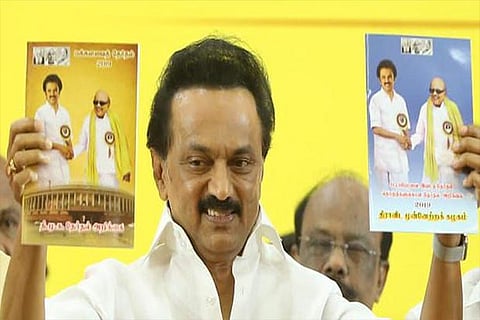

Chennai
The DMK party in its manifesto for the 2019 Parliament election has asked for a greater role for the Inter-State Council. The manifesto also suggested a new mechanism, ‘Regional Council of States’ to strengthen the Centre-State relations.
The PMK manifesto said, “In 213 departments mentioned, Centre’s decision in 152 departments is final. So, a State has been changed into a decorated ‘corporation’. This centralisation of power has affected the people of Tamil Nadu to a great extent.”
It is DMK, which has been consistent in asking for greater autonomy to the States. When DMK captured power in 1967, its founder and first Chief Minister CN Annadurai strongly expressed, “Although I am the Chief Minister and although I am pining to do enormous good for my people, my hands are tied. More powers are necessary for the State. To win those powers, we have to fight the Central government.”
Dr Kalaignar also realised the need for greater power for the States. Being one of the earliest regional parties to come to power, he could see many of his schemes could not be introduced because of the Union’s overriding powers. He even went to the extent of saying that a State government retains the status of ‘Post Box of New Delhi’.
As early as 1971 the election manifesto of the DMK party proclaimed ‘State Autonomy’ as its goal. The party was convinced that more autonomy to the States is the only way to preserve the unity and the integrity of the country. The party developed a slogan, ‘we extend our hand of friendship to the Centre; at the same time, we raise our voice for the rights of our State’.
Not only did the DMK party articulate the idea of ‘State Autonomy’ within the State but it also raised its voice whenever the powers of the other States were infringed and violated. Prior to 1974, the Chief Ministers could hoist the flag on neither the Republic Day nor the Independence Day.
It was DMK and Kalaignar who paved the way for the Chief Minister to unfurl the national flag on the Independence Day since August 15, 1975, which was a monumental achievement of the DMK party and its leader towards the establishment of State Autonomy.
Kalaignar constituted the ‘Rajamannar Committee’ in 1969 to study the relations between the Union and the States and submitted the report in 1974. He named the committee in honour of PV Rajamannar who was the first Indian to become the Chief Justice of the Madras High Court soon after Indian independence (1948-1961).
The Inter-State Council (a mechanism to unite and establish a relationship between and among the States) was the major recommendation of the PV Rajamannar Committee.
It also suggested the following for the smooth functioning of the Union and the States: a) The Union government should not take any decision without consulting the inter-state council when such a decision can affect the interests of one or more States, b) Every bill, which affects the interests of the States should be first referred to the inter-state council before it is introduced in the Parliament, and c) Residuary power of taxation should be vested with the States.
However, these recommendations were completely ignored by the Union government.
The Anandpur Sahib Resolution that was passed by Akali Dal in 1973 suggested making the Indian Constitution a federal one. Furthermore, in 1977 West Bengal Memorandum presented to the Union government urged “to replace the word Union with Federation”.
It also recommended that of the total revenue raised by the centre from all sources 75% should be allocated to the States and demanded coequal powers of Rajya Sabha with Lok Sabha. The 2019, DMK Manifesto is demanding a share of 50% of central revenue with States and an inter-state council will have to decide on the powers of finance commission.
What has been said in the various Commissions on Centre-State relations and particularly about the political parties highlighting the Inter-State Council in the election manifesto? Justice Sarkaria Commission appointed in 1983 submitted its report in 1987.
It is this Commission, which strongly advocated for setting up a permanent Inter-State Council called ‘Inter-governmental Council’. It also suggested for a fresh constitution of the Zonal Councils to promote a spirit of Federalism and suggested that the centre should consult the States before making a law on concurrent list.
MM Punchii Commission in 2007 set up by the UPA government suggested there should be a consultation between the union and the States through Inter-State Council for legislation on concurrent list subjects. Yet another recommendation was mandating the President to state the reasons for vetoing and withholding a bill from a State.
The various commissions on Centre-State relations have reiterated the importance of the Inter-State Council. Now that the political parties have highlighted the role of Inter-State Council during the election time through their manifestos, the problems faced by the States are foregrounded, especially when the regional parties are ruling a State. Now, more than ever they tend to look at State autonomy and Inter-State Council for greater freedom and independence, intensely.
The writer is a political analyst
Visit news.dtnext.in to explore our interactive epaper!
Download the DT Next app for more exciting features!
Click here for iOS
Click here for Android